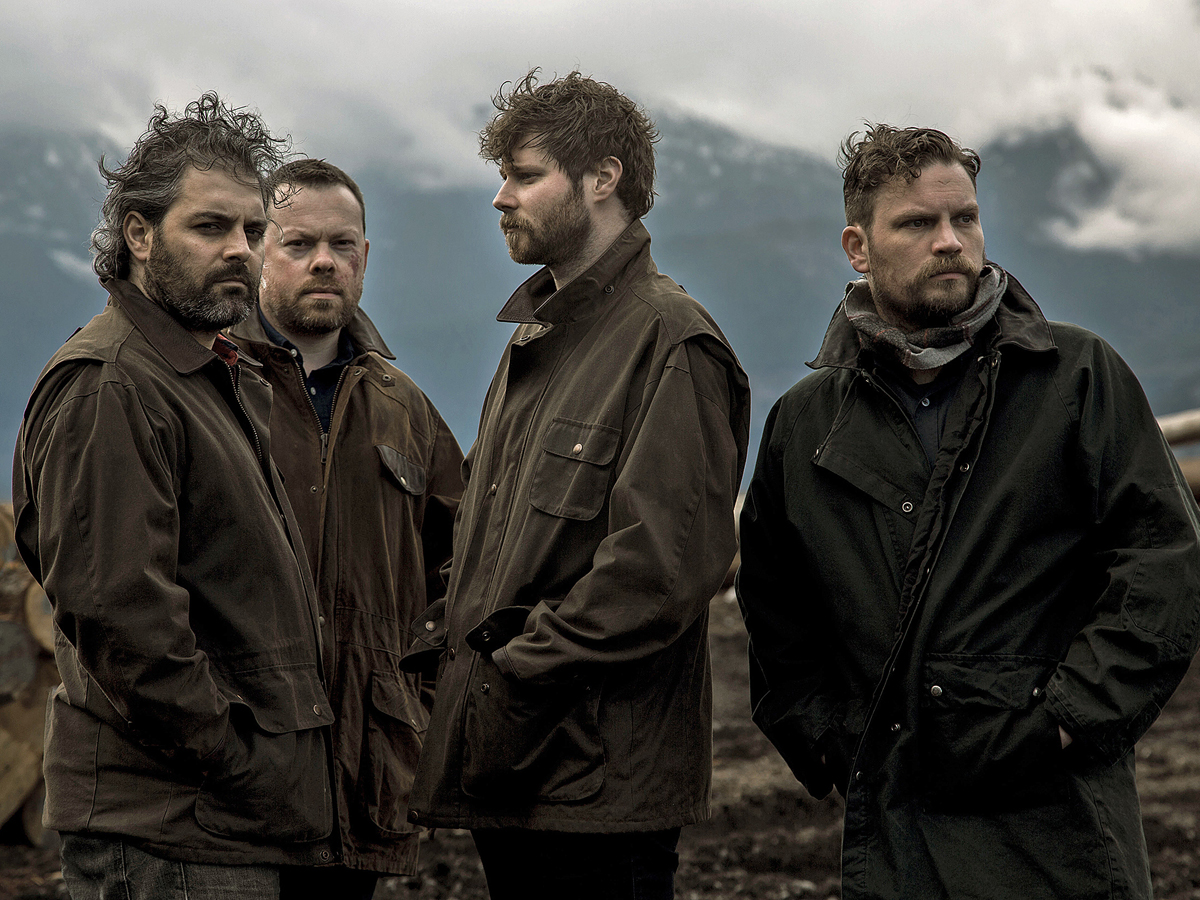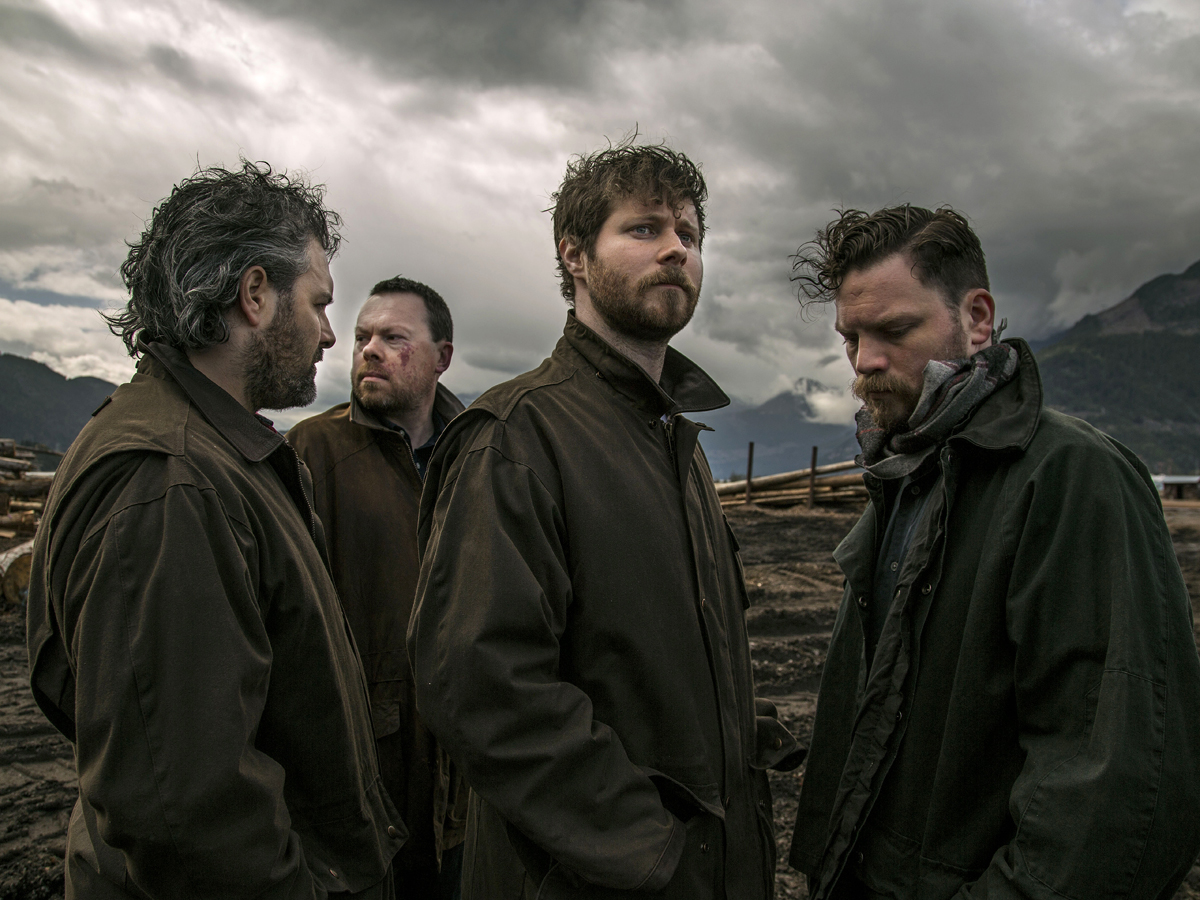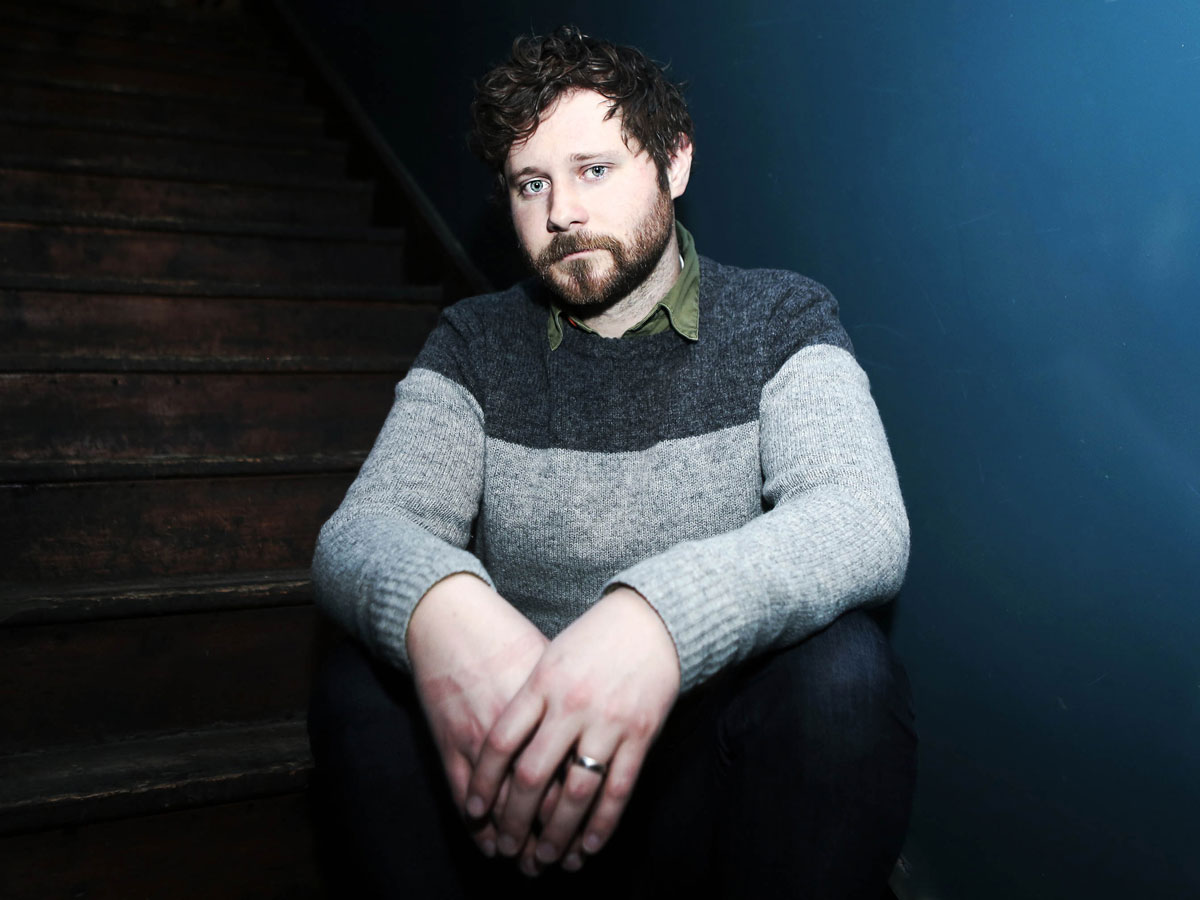Dan Mangan and Gord Grdina discuss Club Meds
Plus Grohl cameos and breaking Bryan Adams' amps

Introduction
Vancouver's Dan Mangan returned from a short hiatus this year with plenty to say alongside his band, Blacksmith. Slicing through the January gloom came the album Club Meds, a brooding masterpiece that looks set to earn greater recognition on both sides of the Atlantic.
We hear how they did it and talk Dave Grohl cameos, free-form jazz, breaking Bryan Adams' amps, and how even vocals sound better when you put them through guitar pedals...
"Mangan's fourth studio album - finds the Vancouver singer-songwriter in articulate form, alongside a pioneering guitarist"
Just 13 days into 2015, Dan Mangan + Blacksmith fired a compelling early salvo in the album of the year stakes. Depicting Louis XVI and Marie Antoinette surveying the wreckage of the global financial meltdown, exploring 18th century German etymology and dystopian Canadian literature, and imploring the listener to find light in a modern world cloaked in existential uncertainty, Club Meds - Mangan's fourth studio album - finds the Vancouver singer-songwriter in articulate form, alongside a pioneering guitarist.
Immersive, beautiful and baroque, the album is also something of a departure. Club Meds, a pun on the sedated, self-medicated travails of 21st century life, was the first release to bear the name of Blacksmith, members of whom played on 2011's Oh Fortune and 2009's Nice, Nice, Very Nice.
It marked a conscious decision to give the band a collaborative role in a darker, more intricate sound than anything in Mangan's 12-year recording career.

Six-string esoterica
It was a brave move, putting the two-time Juno Award winner's considerable reputation in his homeland on the line, with Gordon Grdina's experimental guitar to the fore, alongside bassist John Walsh and drummer Kenton Loewen. Four years after the release of the more traditionally folky Oh Fortune, did Mangan fear alienating the audience he'd spent a decade building?
"We'd gone a long time running off the fumes and momentum of some records we'd made," he explains. "We took some time away and everyone got to exhale. When we reinstated what was going on, it felt like a new page, a new era in the project. There was no fear of holding on to the audience we had. We wanted to make a statement and get expansive."
"I'm a street-learned, clumsy rhythm guitar player, and Gord makes up for it in that he is a guitar player through and through" - Dan Mangan
Grdina, a fellow Vancouver resident who has played alongside Dan since 2010, has a guitar CV that mixes jazz and blues with Arabic classical music and oud playing, juggling Blacksmith with several more esoteric projects. Mangan is a more conventional acoustic player, yet Club Meds sees their styles dovetailing seamlessly.
"I'm a street-learned, clumsy rhythm guitar player, and Gord makes up for it in that he is a guitar player through and through," says Mangan. "I'm a songwriter who has become an adequate guitar player. One of Gord's powers is doing what's right for the song rather than what seems good for him to shine.
"I grew up on the classic songwriters: Van Morrison, The Beatles and Nick Drake. I came up appreciating simple chord structures. When I was younger, I had a boxy idea of what guitar playing was, and everything fit nicely into a mould of first-position chords, and if you get daring you move up the neck, but it's been amazing for me playing with the band.
"All of the guys come from more of an experimental, improvisational free-jazz background, and this is probably the straightest, most pop project they play in, playing in all kinds of chaotic trios, quartets and bizarre Nordic sextets.
"There was a long time when I was travelling around alone with an acoustic guitar, so I learned how to use voice and guitar to grab people. It was a real transition when I started playing with a band of really fine musicians; I had to relearn what it was to listen because I was so used to leading the charge."

Under The Influence
Grdina's restlessly inventive playing illuminates Club Meds, feedback loops, tape echo and piano-like arpeggios embellishing Mangan's acoustic rhythm work amid a heady haze of mournful strings, regal brass and fizzing electronics. At times, it evokes what Radiohead might sound like if they were still making guitar-focused records.
"I think ‘guitarist', I hear the whole fretboard in my head, but I see the notes everywhere and I'm trying to not sound like a guitar player" - Gord Grdina
"Guitar from the beginning, for me, was always rock and blues guys," recalls Grdina. "Stevie Ray Vaughan was huge, Jimmy Page, and then Bill Frisell and Jim Hall were huge influences. Then I got into jazz - Pat Metheny, John Abercrombie, John Scofield... then I got into piano players, so trying to play piano on guitar was a lot of what I've been into.
"Keith Jarrett, Paul Bley were huge influences, and I studied with Gary Peacock, who's a bassist who played with Keith Jarrett. I think ‘guitarist', I hear the whole fretboard in my head, but I see the notes everywhere and I'm trying to not sound like a guitar player."
So, how have these two guitarists from very different parts of the playing spectrum managed to find some common ground, particularly live where almost everything is improvised? It's something UK audiences will soon witness when the band arrive on these shores for a six-date tour in April.
"There's a natural tendency for Dan to play acoustic and me electric," explains Grdina. "I've always loved that sound, ever since old Zeppelin records, where there's acoustic guitar mixed with electric, because it sounds so full. But the connection and communication through it has been more harmonic, not planned.
"When we play it live, all that stuff is improvised. All those guitar parts are not parts, it's a constant moving, floating development of the harmony. There's a fundamental going on, which is Dan's part, and then I dance around it, which makes it fresh and new every time."

Gathering the gear
There's some interesting gear in the Mangan and Blacksmith arsenal, too. Dan plays a '57 Gibson J-45 and his "Frankenstein hollowbody", a late 40s Harmony with P-90s installed, through a '65 Princeton clone made by Californian boutique builder Headstrong.
Vancouver's Union pedals - who made the Third Man Bumble Buzz for Jack White - are represented on Dan's 'board in the More preamp and Buzz Bomb fuzz, alongside an Empress ParaEq.
"We used this Wampler Black '65. It imitates a '65 ‘blackface'. We'd run the vocals through that" - Dan
Grdina's main guitar is a '68 Gibson ES-125, and he also utilises a three-pickup '72 Gibson SG Custom, a hollowbody built by Seattle's Steve Andersen and a '77 hardtail Strat into a '71 Fender Vibrolux and '63 Gibson Falcon.
While recording Club Meds in Bryan Adams' Warehouse studio in Vancouver, Gord borrowed some of his fellow Canadian's amps, too.
"I used his little Supro and a little Champ, and one other amp I can't remember... but I broke two of them," he laughs. Grdina's 'board also houses a Union More, an OCD Overdrive and a Fulltone tape echo.
Guitar pedals were behind Club Meds' hot, distorted vocal sound, too: "We used this Wampler Black '65," says Dan. "It's like a mock Fender amp head. It imitates a '65 ‘blackface'. We'd run the vocals through that. On some of the tracks, we'd do weird s**t like run the vocals through some guitar pedals and into the house at the Warehouse, this big live room, and then re-record it through that."

A Different Class
That rasping vocal sound is an appropriate vehicle for a lyrical set that's rapier-sharp in its observational insight - most notably on the doleful waltz XVI, with its acerbic "let them eat cake" pay-off.
"During the Occupy movement I had this image in my head of unshowered activists in the park and your leading bank dudes in the towers," explains Mangan.
"The further we disconnect and turn off and say ‘the world's hard, I'm just going to focus on my little thing,' the easier it is to cast people aside" - Dan
"They went about their business and were maybe mildly inconvenienced by it all... and how that related to Louis XVI and Marie Antoinette in Versailles while France is in riots and burning and people are starving - and there's such a disconnect. People use the term class war, and I don't think that's what it is, it's like human disconnection and both sides of the coin can't understand the kind of humanity on the other side.
"That song is like a letter home from a Wall Street banker," Dan offers, "and his family's watching the news unfold back in Ohio, and they're saying, ‘This recession's hit us. We're not sure if we're going to be able to keep the home, and all we hear on TV is how you guys f**ked us over - is it true?' And so the banker's writing them a letter from this crippled office, full of dust, and he says, ‘Yeah, absolutely. We totally f **ked you and we're going to continue to f **k you forever.'
"Empathy, compassion and kindness come from feeling connected to human beings, and the further we disconnect and turn off and say ‘the world's hard, I'm just going to focus on my little thing,' the easier it is to cast people aside."

Hope in the hopeless
Have Mangan and his band lost faith in humanity and surrendered to that darkness? Conversely, there's immense optimism in their music.
There's also a subtle cameo: Foo Fighter Dave Grohl, a teenage hero of Dan's, sings backing vocals on Vessel, written for the soundtrack to the film Hector And The Search For Happiness, starring Simon Pegg, for which Mangan co-wrote the score.
"I didn't want people to get lost in the darkness. Hopefully, people see the light that is in the record" - Dan
"The world is chaos, everything is f **ked up, and people are screwed up and everything's insane, and yet everything is totally beautiful and amazing," asserts Dan, "and I didn't want people to get lost in the darkness. Hopefully, people see the light that is in the record. It's not just darkness, it's appreciation for the darkness and therefore being able to see the light as well."
As we leave Dan to embark on a globe-trotting tour that will span much of 2015, we wonder whether he feels a sense of vindication, having produced his most acclaimed, yet also politically outspoken and expansive work, without compromising by making a more commercially palatable record?
"One of the pros of having taken the long journey is appreciating every little step along the way," he concludes. "If we had just come out with a record like this out of the gate and stepped way up, I don't know if I'd have such an appreciation for all the little things that have gone on. We're very appreciative of all the amazing things that have come our way."
Dan Mangan + Blacksmith's UK tour starts on 24 April 2015 in Manchester. Club Meds is available now on Arts & Crafts records.

